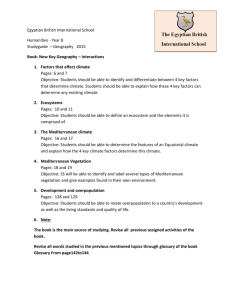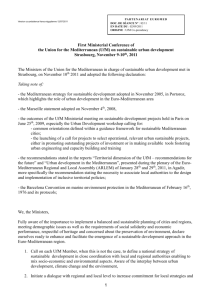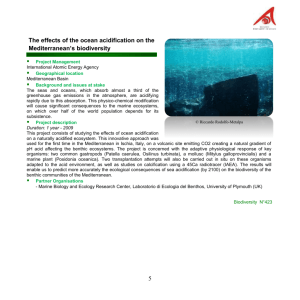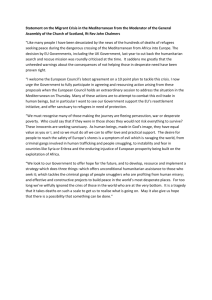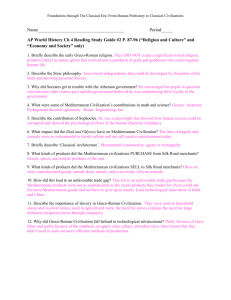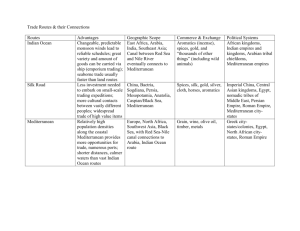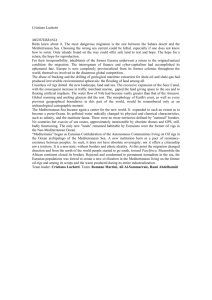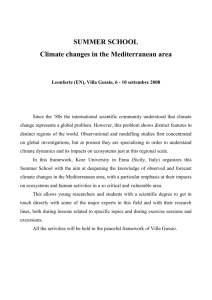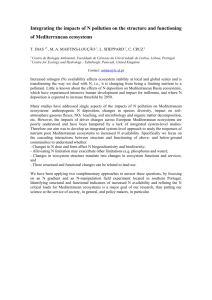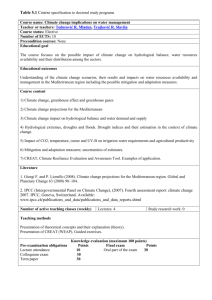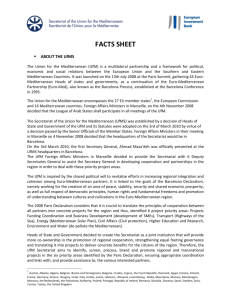DOC - Europa
advertisement
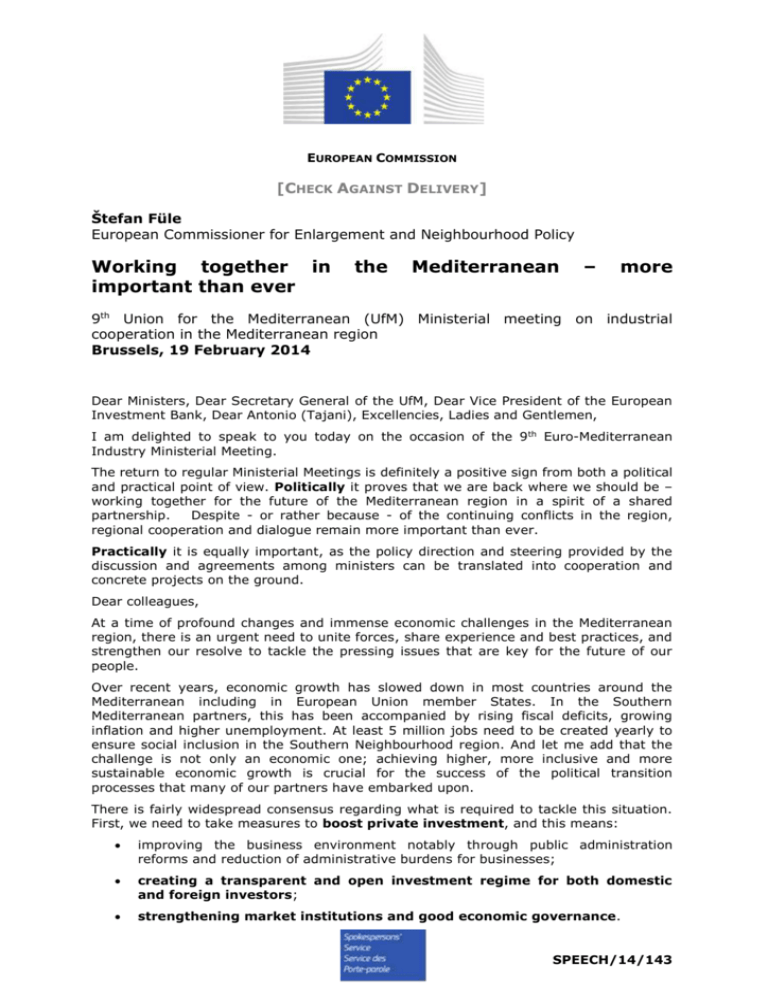
EUROPEAN COMMISSION [CHECK AGAINST DELIVERY] Štefan Füle European Commissioner for Enlargement and Neighbourhood Policy Working together in important than ever the Mediterranean – more 9th Union for the Mediterranean (UfM) Ministerial meeting on industrial cooperation in the Mediterranean region Brussels, 19 February 2014 Dear Ministers, Dear Secretary General of the UfM, Dear Vice President of the European Investment Bank, Dear Antonio (Tajani), Excellencies, Ladies and Gentlemen, I am delighted to speak to you today on the occasion of the 9 th Euro-Mediterranean Industry Ministerial Meeting. The return to regular Ministerial Meetings is definitely a positive sign from both a political and practical point of view. Politically it proves that we are back where we should be – working together for the future of the Mediterranean region in a spirit of a shared partnership. Despite - or rather because - of the continuing conflicts in the region, regional cooperation and dialogue remain more important than ever. Practically it is equally important, as the policy direction and steering provided by the discussion and agreements among ministers can be translated into cooperation and concrete projects on the ground. Dear colleagues, At a time of profound changes and immense economic challenges in the Mediterranean region, there is an urgent need to unite forces, share experience and best practices, and strengthen our resolve to tackle the pressing issues that are key for the future of our people. Over recent years, economic growth has slowed down in most countries around the Mediterranean including in European Union member States. In the Southern Mediterranean partners, this has been accompanied by rising fiscal deficits, growing inflation and higher unemployment. At least 5 million jobs need to be created yearly to ensure social inclusion in the Southern Neighbourhood region. And let me add that the challenge is not only an economic one; achieving higher, more inclusive and more sustainable economic growth is crucial for the success of the political transition processes that many of our partners have embarked upon. There is fairly widespread consensus regarding what is required to tackle this situation. First, we need to take measures to boost private investment, and this means: improving the business environment notably through public administration reforms and reduction of administrative burdens for businesses; creating a transparent and open investment regime for both domestic and foreign investors; strengthening market institutions and good economic governance. SPEECH/14/143 It also means that we should continue: supporting business and investment linkages in the Mediterranean (NorthSouth and South-South); stimulating SME development in innovative and value-added sectors; upgrading skills in particular for the youth; and facilitating trade and access to finance. The full participation of women in the socio-economic dynamics and their full access to the labour market are also crucial factors of economic development. Let me emphasise in particular that the largest opportunity for growth and jobs lies with the 6 million micro, small and medium enterprises (mSMEs) that account for 90% of total employment. Dear Ministers, Ladies and Gentlemen, Actions matter, not words. To countries committed to change in these areas, the European Union provides substantial expertise and financial support to help governments undertake the necessary reforms. First, we are convinced that openness to trade and investment will be an important source of job creation, technological progress and innovation. It will also support economic diversification and sustainable growth. To this end, the European Union is working to establish economic integration agreements (so called Deep and Comprehensive Free Trade Areas DCFTAs) with Egypt, Jordan, Morocco and Tunisia. Their aim is to ensure gradual economic integration within the European market. Incentives for investments will be greater if the market opportunities are wider. Ambitions can be greater: if prospects for enterprise development can be envisaged on a much wider scale; if doing business is easier; and if a better skilled workforce is available to meet demands. Second, we recognise that liberalisation of trade and investment is a complex process that can entail short term adjustment costs. This is why the European Union is keen to facilitate investment and stimulate private sector development. In fact, since 2011 the European Union has committed more than €800 million of bilateral assistance in budget support and technical assistance towards inclusive growth policies in the region. It includes programmes to support: rural development; agricultural SMEs: research and innovation; trade and domestic market enhancement; employment creation and income generation for the poor; and economic governance / public financial management. Considerable support is also provided, across the region for reform of the vocational training and education sectors, with a particular focus on the employability of women. 2 In addition, since 2011, the Neighbourhood Investment Facility (the so-called NIF) provided almost €335 million for projects in the Southern Mediterranean. Together with loans from European public finance institutions of around €4 billion, this strategic use of European Union grants and loans has unlocked total financing of €10 billion! Dear Ministers, Ladies and Gentlemen, Looking ahead let me stress four points that will inspire the work of the European Union. First, we will continue our support for the development of the private sector and we will increase our partnership with financial institutions through the use of blending mechanisms. In a context of constrained resources, the blending of grants and loans will be further expanded by the European Union in its new assistance programming cycle for the period 2014-20. This can leverage additional resources (10 to 20 times the amount of the European Union grants) to increase the volume of development finance available for projects. We will also continue encouraging all partners to pay particular attention to creating and maintaining favourable conditions for attracting private investors and securing investments in their countries. In this regard, the Commission is working with the OECD and World Bank to strengthen the ISMED (Investment Security In the Mediterranean) Working Group which aims at developing tools and advice for the benefit of partner countries and investors in large scale projects. Second, let us make the best use of the Union for the Mediterranean. The Secretariat has been working intensively in the field of private sector development, mobilising investors and securing the commitment of donors and International Financial Institutions to the funding of important projects. Let us deepen our dialogue with the Secretariat to ensure an increase in the number of projects endorsed by the UfM, and more of them involving the private sector. Let us reflect also with the Private sector on how it can take advantage of the UfM expertise and the UfM label. And let us establish a close link between the work plan to be adopted today and the priorities of the Secretariat. Third, let us unite and better coordinate our efforts. Putting in place a truly open regional dialogue on employment, private sector development and inclusive growth is key. The exchange of experience between the various stakeholders; the identification of success stories including their replication; the identification of new structuring initiatives of regional impact; these should all be promoted and brought together through a specific platform of the UfM. Also, the potential of closer intra-regional cooperation is largely untapped in a widely unintegrated region. I am encouraged that business associations of the Maghreb countries met on Monday and Tuesday in Marrakech and decided to launch an initiative to promote closer economic integration. The European Union supports this initiative. Fourth, let us adopt a truly inclusive approach. The European Union's comprehensive cooperation and assistance needs to be rooted in a constructive policy dialogue not only with governments but also with other stakeholders, and in particular with representatives of the private sector, of trade unions and of civil society at large. This ensures the ownership needed to achieve the goal of creating inclusive growth. Dear Ministers, Ladies and Gentlemen, 3 Our task today is to provide political support and guidance so that good conditions are in place to stimulate growth and job creation. This is the purpose of the documents approved today: the Ministerial Declaration and Work Programme. The decisions that you are taking today to promote entrepreneurship and SME development are essential in the process of ensuring sustainable development and stability in the region. The challenges are significant but I am convinced that there is an immense potential in the region. The key for success is to continue in our partnership for reform and modernisation. Of course, the responsibility for the reforms lies ultimately with each government. However, closer regional dialogue and cooperation can usefully contribute to the objective of more inclusive and sustainable growth. I want to emphasise that the European Union is fully committed to making this a success. Thank you for your attention. 4
